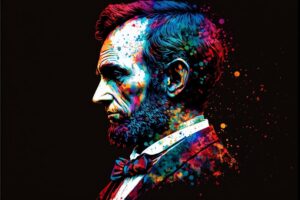 We are so used to being importuned to count our blessings and avoid politics at Thanksgiving that we forget that the politicians forged our modern tradition in the fire of sin — slavery, and our failure to end it peacefully, subjects that couldn’t possibly have been avoided at dinnertime 161 Thursdays ago.
We are so used to being importuned to count our blessings and avoid politics at Thanksgiving that we forget that the politicians forged our modern tradition in the fire of sin — slavery, and our failure to end it peacefully, subjects that couldn’t possibly have been avoided at dinnertime 161 Thursdays ago.
Though autumn thanksgiving festivals had been around for centuries, Abraham Lincoln commenced the annual national holiday. In his 1863 Thanksgiving proclamation, he extolled the miracles of “fruitful fields and healthful skies” notwithstanding the Civil War, which he called “our national perverseness and disobedience.” See how little we deserve our blessings, Lincoln wrote. And yet “[t]hey are the gracious gifts of the Most High God, who, while dealing with us in anger for our sins, hath nevertheless remembered mercy.”
In Lincoln’s day, thousands of cousins took up arms against one another, hundreds of brothers, even fathers and sons. Some, including Lincoln in his Second Inaugural, asked how anyone could fight for the right to enslave other people. Southern traitors to the union asked what right the north had to take away the south’s way of life. While the narratives weren’t remotely equivalent morally, people were willing to die for them both.
Rarely since then have our bonds of civic and familial affection been so strained. Especially since Trump, we’ve been making gags about how hard it is to get along at Thanksgiving dinner with the proverbial rightwing Uncle Joe or leftwing cousin Meredith. We too have our unreconcilable narratives. This week, roughly half of us are mourning as prosecutors pack their boxes. They ask how Trump got away with trying to overturn an election and overthrow our government. They also believe he will be a terrible president, flagrantly disrespectful of the dignity of every human being. The other half, their hopes for the next four years correspondingly higher, cry lawfare and say the people have spoken.
Rare is the citizen who says Trump’s a crook and slob, and that’s okay with them thanks to his good ideas, or that he’s been unjustly persecuted notwithstanding his execrable temperament and policies. We are becoming a nation where truth is utterly malleable based on political preference. It has always been thus to an extent. Civic fables usually rely on the clarity of Luke Skywalker and Darth Vader. I have progressive friends who feel a little sour of stomach when I extoll the periodic virtuousness of my old boss, Richard Nixon.
But our flocking together more and more on the basis of race, region, and educational and economic attainment is making it harder to decipher our fellow Americans’ passions. As hewing to our views, even when we’re right, causes our houses, churches, and friendship circles to be divided against themselves, it is easy to wonder if national unity, and a shared sense of purpose, are again slipping from our grasp.
Lincoln, at least, thought us redeemable, even in darker hours. As he wrote in his Thanksgiving message, “I…fervently implore the interposition of the Almighty Hand to heal the wounds of the nation and to restore it as soon as may be consistent with the Divine purposes to the full enjoyment of peace, harmony, tranquility, and union.” Amen — and happy Thanksgiving!
